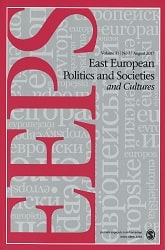Challenging the Odds: Incumbency Disadvantage, Local Ties, and Electoral Performance in Hungary, 1994–2010
Challenging the Odds: Incumbency Disadvantage, Local Ties, and Electoral Performance in Hungary, 1994–2010
Author(s): Zsófia PappSubject(s): Political history, Electoral systems, Transformation Period (1990 - 2010), Sociology of Politics
Published by: SAGE Publications Ltd
Keywords: elections; Hungary; incumbency; local politicians;
Summary/Abstract: Most empirical studies of the effect of incumbency conclude that being a defender of the seat is an advantage and that newcomers and challengers alike have increasingly lower probabilities of winning. Yet, the majority of these studies in Eastern Europe have been based on tumultuous political environments in which electoral rules change frequently. A test of the theory of how candidate traits such as legislative and local political experience increase incumbents’ electoral performance has not been done in an environment in which the electoral rules are stable. Furthermore, these studies are based in proportional representation (PR) systems, which amplify the role of the party leadership in determining candidate fate through candidate rankings. I examine Hungary’s mixed-member system using candidate-level panel data that covers Hungarian national elections from 1994 to 2010, and contains basic information on all candidates running in SMDs. I find that Hungarian SMD incumbents perform worse at the elections than their challengers. However, in the long run, legislative experience in SMDs neutralizes this effect. Additionally, local politicians, such as mayors, manage to increase their vote share at national elections.
Journal: East European Politics and Societies
- Issue Year: 32/2018
- Issue No: 03
- Page Range: 518-543
- Page Count: 26
- Language: English
- Content File-PDF

